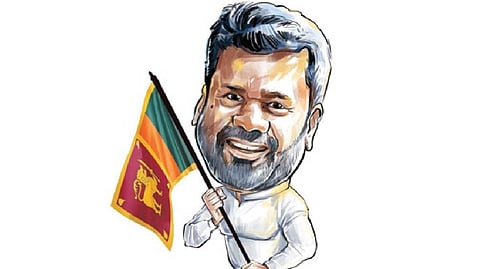

Young Anura Dissanayake grew up amid lush paddy fields, ancient irrigation tanks and vegetable plots. Though a typical, happy-go-lucky village boy, besides the childhood pranks, there was a seriousness that made him keenly aware of his surroundings and the disparities.
As a kid, some weekends were spent selling candy on a train that rolled between his hometown Thambuttegama and Galgamuwa. If the passengers occasionally included teachers from his school, Dissanayake and his friends would quickly push the goodies under the seats. At other times, he joined his family to cultivate their paddy lands and chilli plots.
A bright student, Dissanayake, 56, harboured no big dreams. His simple family was even less ambitious than he. “It would have been the jewel in their crown if I became a teacher,” says Dissanayake. As much as he was a good student, Dissanayake was equally good at transferring knowledge. He would occasionally offer private tuition in maths to a handful of students. This ability came in handy when he joined the Marxist Janatha Vimukthi Peramuna (JVP) in 1987 and experienced as an insider, the full impact of the second JVP insurgency (1987-89).
The student activist spent over two years in hiding, and his parents’ modest home in Thambuttegama was torched by mobs, driving his parents and sister to find temporary shelter at an aunt’s kitchen. At the same time, he became the first student to enter university from his village, but being underground, his university education got interrupted. In 1993, as the JVP returned to mainstream politics, Dissanayake got himself transferred to the University of Kelaniya and obtained his degree in 1995.
As politics consumed his entire life, he took to full time politics, post graduation.
Rural poverty left a strong impression on Dissanayake. “Poverty is not about lacking food and clothes. It is a vulnerability that allows others to treat you with disdain; discriminate. It creates a strata difference that is impossible to shake. Just watch how people treat the poor. They experience a lack of social acceptance; injustice and a loss of dignity. So poverty defines your identity,” Dissanayake said in a 2022 interview.
What’s more, there is societal pressure that is linked to poverty. “My politics started with the understanding of this deep-rooted lack of equality. It never mattered whether I succeeded or not. I had to try. I have dedicated myself to help create a better life for these people who are living in the margins of society, eternally struggling. Some consider mine to be a futile struggle but I am deeply content with the choice I have made and to spend my life in the pursuit of a dream,” Dissanayake said in the same interview.
His JVP colleagues recognise Dissanayake’s ability to put his nose to the ground and work towards the end goal. A former JVP legislator who entered parliament with Dissanayake in 2000 says, “AKD has dogged determination. He is true to his cause and extremely grounded.”
In a political career spanning over 35 years, Dissanayake, commonly referred to as AKD, his initials, that determination is impossible to miss. Student politics has given way to a 24-year stint as a legislator. In 1995, he became a JVP politbureau member. From 2004-2005, he held the cabinet portfolio of a coalition government between President Chandrika Kumaratunge’s Sri Lanka Freedom Party (SLFP) and the JVP. In 2014, Dissanayake replaced Somawansa Amarasinghe as the party’s next leader. He also served as Chief Opposition Whip from 2015 to 2018.
Dissanayake is credited for working tirelessly to improve the JVP’s image, a party responsible for two southern uprisings in 1971 and 1987-1989 that had left an indelible imprint on the public psyche. Even his detractors agree that Dissanayake has given his best to modernise the political party that was once outlawed and feared by a section of the public.
When Sri Lanka experienced an unprecedented economic crisis in 2022 and spurred public protests, the ground began to shift swiftly in favour of the JVP. By then, the JVP had formed a broad coalition, the National People’s Power (NPP), also led by Dissanayake. The public anger against family rule, grand corruption, the economic hardships and governance collapse had prepared the country for a different political experience.
Prior to the September 21 presidential hustings, opinion polls recognised Dissanayake as the country’s most trusted politician at a time when politicians were anathema to the people. Part anti-corruption crusader and part reformist, the village lad shattered the 76 years of elite politics by becoming the island’s 10th president last week.